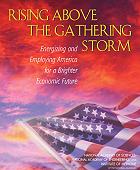|
|
|
|
|
|
|
News & Views item - June 2009 |
![]() What Do Research Universities Need? (June 24, 2009)
What Do Research Universities Need? (June 24, 2009)
A letter by four members of the US Congress written to the presidents of that nation's National Academy of Sciences, National Academy of Engineering and Institute of Medicine gives an indication of the differences in approach in addressing problems of academic research in the United States and Australia.
Yesterday Senators Barbara Mikulski (D–MD) and Lamar Alexander (R–TN), and Representatives Bart Gordon (D–TN) and Ralph Hall (R-TX) wrote to Ralph Cicerone, Charles Vest and Harvey Fineberg, presidents respectively of the National Academy of Sciences, National A(D–MD)cademy of Engineering and Institute of Medicine posing the following question:
What are the top ten actions that Congress, state governments, research universities, and others could take to assure the ability of the American research university to maintain the excellence in research and doctoral education needed to help the United States compete, prosper, and achieve national goals for health, energy, the environment, and security in the global community of the 21st century?
 The
letter
The
letter![]() ,
requests the three organisations to "assemble a distinguished group of
individuals" to address the matter with regard to both the nation's public and
private research universities. It'll be remembered that in 2005 a comparable
letter resulted in
Rising Above the Gathering Storm which addressed
how to strengthen the U.S. economy by increasing the nation's investment in
the research and training of the scientific workforce.
,
requests the three organisations to "assemble a distinguished group of
individuals" to address the matter with regard to both the nation's public and
private research universities. It'll be remembered that in 2005 a comparable
letter resulted in
Rising Above the Gathering Storm which addressed
how to strengthen the U.S. economy by increasing the nation's investment in
the research and training of the scientific workforce.
According to ScienceInsider the letter is the result of "a February meeting between Senator Lamar Alexander (R–TN) and Robert Berdahl, president of the Association of American Universities in Washington, D.C., during which Berdahl stressed the 'growing disparity of resources' between leading private and public research universities".
It is understood that the three presidents "are pleased with the letter and will be meeting this summer to discuss how best to carry out the study."
Meanwhile, Andrew Trounson reports today in The Australian's HES: "As the research sector waits for further details on how the federal government's "hubs-and-spokes" and compacts strategies will work to maximise scarce research dollars, there are warnings that rising research investment spending in the US and parts of Europe and Asia means Australia's competitive standing risks going backwards in the long term without an additional boost to core capacity through grants."
Rather than seeking an arm's length assessment such as requested by Senator Mikulski & Co, the Rudd government, just as has been done by its processors for yonks, hold reviews which are more or less tightly controlled through terms of reference by the government of the day. There is certainly nothing resembling a bipartisan request to the Australian Academy of Science and the Australian Academy of Technological Sciences and Engineering asking:
What are the top ten actions that the federal government, state governments, research universities, and others could take to assure the ability of Australian research universities to obtain the excellence in research and doctoral education needed to help Australia compete, prosper, and achieve national goals for health, energy, the environment, and security in the global community of the 21st century?
The Federal Budget in May is the Rudd government's response to the Bradley review of higher education and the Butler review of Australia's innovation system.
The good news is that the government's support for higher education research and innovative development is not only greater than expected but far greater than would have been received from its immediate predecessor.
Nevertheless, according to University of Melbourne's chair of higher education, Simon Marginson, the government's May budget boost for research was insufficient to stop Australia's research-intensive universities regressing relative to their international cohort: "I think they have to go backwards under the current settings in the long term, given the ways other countries are seriously building research capacity with direct investment by governments who don't have any problem in giving it out to the best research centre and the best institution." He all told Mr Trounson: "I think we have to lift core capacity and that is grants and fellowships in all disciplines."
However, the vice-chancellor of the Australian National University, Professor
Ian Chubb told Mr Trounson that hubs-and-spokes and compacts would be a
"serious structural reform" towards better concentrating research. "The
challenge for us is to fund really high-quality research where we find it and
not all the research the people say they do."
And according to Mr Trounson while some were calling for an increase in ARC competitive grants (such as Macquarie University's V-C Steven Schwartz), Professor Chubb was more ambivalent, warning that the lottery-like nature of the grants made it difficult to map out institutional research strategies. "I think it is better for us to have the funds and to be able to act and operate strategically," which can be seen as contradictory to his view stated in the preceding paragraph, "...to fund really high-quality research where we find it..."
Ultimately the approach of inadequate resourcing and of dictating from the top
the nation's basic research together with governmental micromanagement of
translational research brings to mind the admonition by the president of the
European Research Council, Fotis Kafatos -- if you think excellence is
expensive, try mediocrity. The continued attack by both governments and
university administrations on the the collegiate governance of universities will
stultify them and the best of academic staff will simply desert to more
salubrious climes with the consequences reverberating throughout all sectors of
the nation's culture and economy.